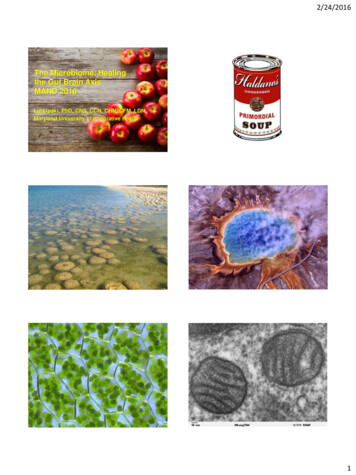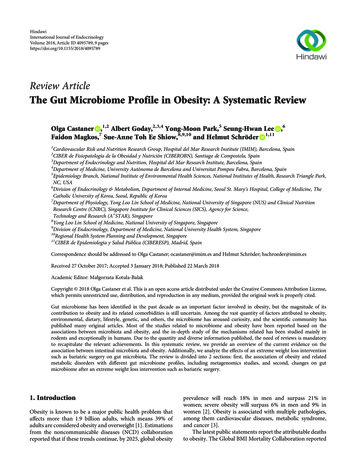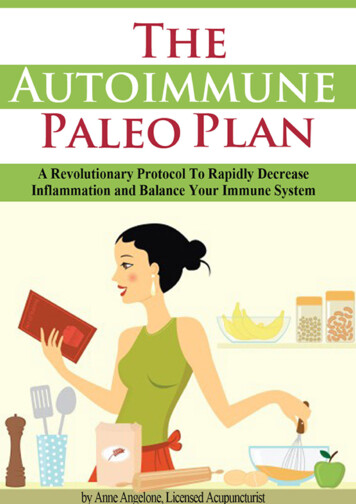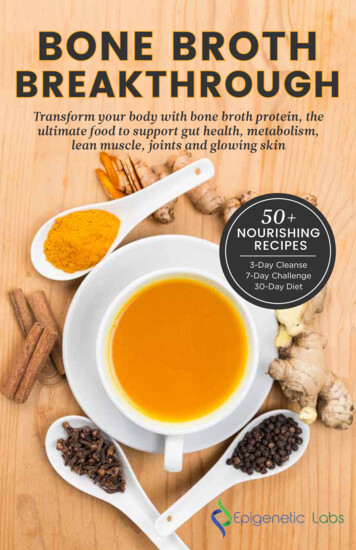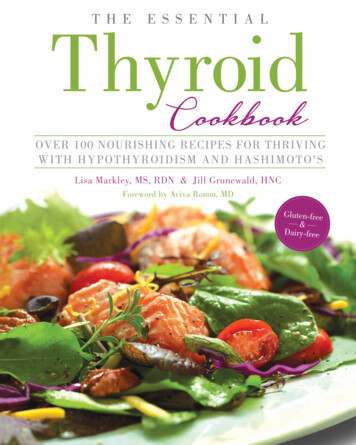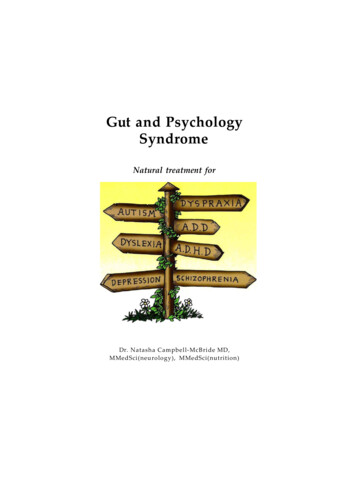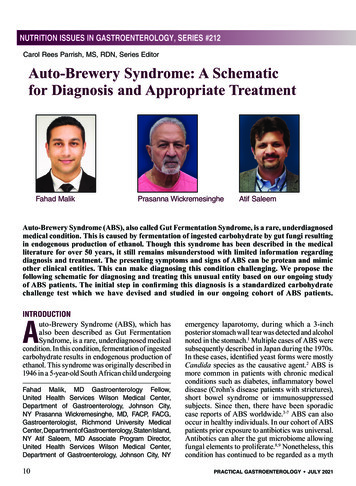
Transcription
THE BENEFITS OFGood GutHealthFROM THE EXPERTS AT THE ARTHRITIS FOUNDATION
The Microbiome andWhy It MattersThe gut microbiome plays an integral part in the well-being of peoplewith arthritis. Learn how you can benefit from good gut health.Balance is often the key to a happy, healthylife, and when it comes to your gut, that oldadage couldn’t be more accurate. Like a garden that requires the right balance ofnutrients to produce the healthiest plants, ahealthy, balanced gut microbiome – the ecosystem of trillions of microorganisms inhabitingthe digestive tract – may help s tabilize theimmune system. The gut microbiome is associated with many health and disease impactsin the body, including overall health andinflammatory forms of arthritis.In addition to the gut, microbes inhabit everypart of the body, creating different ecosystemsin various areas, such as the nasal micro biomeand the skin micro biome. Each one interacts with the immune system and greatlyaffects how it responds. When it is outof balance – generally from illness, poordiet, antibiotics, smoking, stress or obesity – the immune system can also get outof whack. This “dysbiosis” is an imbalancein the types and numbers of microbes withless microbial diversity overall, which maylet the balance of harmful versus helpfulmicrobes tip in the unhealthy direction. Whenthis happens, chronic low-grade inflammation and disease may follow, according toThomas W. Buford, PhD, associate professorand endowed scholar in the Department ofMedicine at the University of Alabama atBirmingham. Dysbiosis has been linked toautoimmune diseases including rheumatoidarthritis (RA), psoriatic arthritis (PsA), ankylosingspondylitis (AS) and systemic lupus erythematosus.CONTENTS234568910The Microbiome and Why It MattersThe Gut-Arthritis ConnectionHow to Get Good Gut HealthThe ITIS DietStaples of the ITIS DietGrocery Shopping for Your MicrobiomeA Day’s Menu from the ITIS DietAdditional Resources*2 ARTHRITIS FOUNDATION ARTHRITIS.ORGTo learn more aboutthe benefits of the gutmicrobiome from topexperts in the field, tune in to theArthritis Foundation’s Live Yes!With Arthritis podcast episode: Microbiome, Gut Health & Arthritis.
The Gut-Arthritis Connection Evidence suggests that autoimmune diseasesmay develop when microbes in the gut, mouthor skin – sometimes all three – send the wrongsignals to the immune system.Recently, Chinese researchers found that peoplewith AS had much higher levels of an intestinalfungus called Ascomycota and lower levels ofthe fungus Basidiomycota than did those withoutAS. People with inflammatory bowel disease(IBD) – a group of disorders, including Crohn’sdisease and ulcerative colitis – have a similarpattern. About 10% of people with AS also haveIBD, suggesting the two diseases may be linkedto the same inflammatory process. In the UnitedStates, researchers found that women withlupus had five times as much of the gut bacteria Ruminococcus gnavus (RG) as healthywomen did. Those with severe symptoms orthe related kidney disease lupus nephritis hadeven more. The researchers suspect that RGactually causes lupus nephritis. People with IBDand AS also have too much of these bacteria,suggesting another link between the microbiomeand autoimmune conditions.The gut connection is also strong in RA. Forexample, studies of people with early RAshow their microbiota composition is often lesshealthy than those without RA.*Read more about the research behind the ITIS dietand how the diet may help your inflammation.“One explanation for what might be happening isthe ‘leaky gut’ hypothesis, in which the gut becomesmore permeable, and fragments of these microbiotaescape into the bloodstream,” Buford says. “There,the immune system recognizes them as foreignand responds with inflammation that can invadejoint tissues.”associate professor of immunology at MayoClinic in Rochester, Minnesota, echoes manyother researchers: “It’s clear that gut [microbes]play a significant role in immune regulations andthat alterations in [microbiome] composition causean abnormal immune response,” she says. But anexact cause is still unknown.But what exactly is the link? Is dysbiosis a causeor an effect of disease? Veena Taneja, PhD, anTaneja thinks doctors will treat disease in the futureusing “microbes derived from the person’s own gut.”3 ARTHRITIS FOUNDATION ARTHRITIS.ORG
How to Get Good Gut Health Experts agree that the best way to cultivate theproper balance of gut microbiota is through food,managing stress and getting regular exerciseand restorative sleep. Certain foods help feedmicrobes (prebiotics), while others contain healthymicroorganisms (probiotics), so consuming ahealthy, diverse diet that includes both will contribute to a healthy microbiome. Probiotic andprebiotic supplements may also help boost levelsof healthy microorganisms, at least temporarily, butfood sources are the best choices for the long-term.What you eat can greatly encourage or inhibit thegrowth of certain types of gut bacteria, increase ordecrease overall diversity and influence metabolites the microbes produce, which are key playersin activating inflammation. The Mediterranean diethas been shown to have anti-inflammatory effectsfor arthritis and related conditions such as heartdisease and diabetes. Scientists trace its benefits inpart to its positive effect on the microbiome.“We know the Mediterranean diet is good forpatients with rheumatoid arthritis,” says MonicaGuma, MD, PhD, rheumatologist and researcherat the University of California, San Diego. “Butthere also might be something better.” Somethinglike the diet she and her colleagues designed.4 ARTHRITIS FOUNDATION ARTHRITIS.ORG
The ITIS Diet They spent a year designing what she calls theITIS diet*, a plant-based diet supercharged withanti-inflammatory foods and herbs that mayimprove gut health and arthritis symptoms.Dr. Guma emphasizes that she’s not suggestingthe diet can replace arthritis drugs. It had severalimportant limitations: There was no control groupfor comparison. And it’s unknown if ITIS has long-term benefits. (In studies of the Mediterraneandiet, the benefits disappeared when peoplestopped following it.) Dr. Guma plans to conductlonger trials with more participants.There is no evidence that this diet changes themicrobiome, which is very difficult to do, Dr. Gumasays. “It might need months of diet to actually makea meaningful change.” It may help reduce inflammation and symptoms, though.The diet includes many things the standard Mediterranean doesn’t, including a daily homemade greendrink (green vegetables and fruit); a high dailyintake of monounsaturated fatty acids (MUFA); dailygreen tea and more. It also excludes some thingsthe M editerranean diet allows, such as gluten andnightshade vegetables, which may worsen arthritissymptoms in some people.In her study, 22 highly motivated RA patientsfollowed the ITIS diet for two weeks whilecontinuing their prescribed medications. Halfexperienced a 50% improvement in pain andswelling as well as in subjective measures suchas fatigue, often in three or four days. A fewpatients went into complete remission. Even the50% who did not show improvements felt better and had more energy and less fatigue, Dr.Guma says, but it’s not clear why some didn’thave less pain and swelling, too.*Funded by the Center for Integrative Health at University of California, San Diego5 ARTHRITIS FOUNDATION ARTHRITIS.ORG
Staples of the ITIS DietMAIN RECOMMENDATIONS(WHAT/WHAT FOR)BASED ON (WHY)DIET STRATEGIES (HOW)Lower the omega-6/omega-3 polyunsaturated fatty acids (PUFA) ratio to 2:1.A low omega-6/omega-3 PUFA ratio reduces inflammation and improves autoimmunity symptoms.The diet must contain fatty fish twice per week anddaily intake of omega-3 sources, like chia seeds and flaxseed oil.Increase intake of monounsaturated fattyacids (MUFA).MUFA have a beneficial effect in rheumatoid arthritis (RA).Daily intake of MUFA-rich nuts, seeds and vegetablesDecrease intake of pro-inflammatory fattyacids (FA) such as trans-FA and saturated FA(present in dairy products, red meat andprocessed foods).Industrially produced trans-FA increase inflammatorymarkers and saturated FA increase inflammation.Avoid pre-cooked food, red meat and processedmeat. Cook by baking, boiling or vapor. Avoid fryingfor long periods because it modifies PUFA to trans-FA.High intake of prebioticsDietary fiber, whole-grain complex carbohydrates andsugar alcohols present in fruits are prebiotics that supporthealthy microbiome and increase short-chain fatty acidproduction, improving immunity.Daily green leafy vegetables, fruits and homemadegreen juice (prebiotic source). Promote whole grains(prebiotic source) and avoid refined flours.Daily intake of probioticsProbiotics reduce levels of pro-inflammatorycytokines and improve disease activity in RA.Daily yogurt (a brand that contains Lactobacillus Caseiamong other species) and miso (probiotic source)Help digestion of large proteins in the gutFiber consumption and enzymatic fruits will help proteindigestion. Bromelain and papain were shown to havean anti-inflammatory effect as well. Large proteins indairy products are not completely digested and canfeed proteolytic bacteria, resulting in the production ofpro-inflammatory metabolites.Daily enzymatic fruit (pineapple, mango and papayaare sources of bromelain, papain and other proteolyticenzymes). Increase fiber intake. Substitute plant-basedmilks (almond, rice, coconut) for dairy.Condiment with anti-inflammatory spicesTurmeric, black pepper and ginger have antioxidantand anti-inflammatory actions. Black pepper increasesbioavailability of curcuma in turmeric.Turmeric and black pepper should be used at thesame time.6 ARTHRITIS FOUNDATION ARTHRITIS.ORG
Staples of the ITIS DietMAIN RECOMMENDATIONS(WHAT/WHAT FOR)BASED ON (WHY)DIET STRATEGIES (HOW)Eliminate salt.High salt intake has been related to autoimmunity.Lower salt intake by eliminating precooked food.Substitute vegetables with potential antiinflammatory properties for solanaceae(nightshade) vegetables.Solanaceae vegetables contain glycoalkaloids. Glycoalkaloids have been reported to affect intestinal permeability. Vegetables with high content of phytochemicalswere s uggested to have anti-inflammatory properties.Avoid the consumption of nightshade vegetables andincrease consumption of phytochemical-rich vegetables.Decrease consumption of red meat.It contains high levels of choline, which is the precursorof the inflammatory metabolite trimethylamine N-oxide(TMAO) and saturated FA.Introduce healthy proteins like legumes, poultry and whitefish, two to three days a week each. Avoid red meat.Reduce consumption of gluten.Gluten has been associated with inflammatory states.Pseudocereals and whole grains reduce inflammation.Replace refined wheat with whole grains.Avoid sugars, sugary foods and sugarybeverages.Sugary foods and beverages are linked to obesity, microbiome changes and low-grade inflammatory state.Substitute honey for sugar. Avoid soda and juices.Substitute green tea for coffee.Green tea contains polyphenols which decrease pro- inflammatory cytokines in animal and in vitro models of RA.Drink green tea daily.Increase the intake of antioxidants, phytochemicals, vitamins and flavonoids.Antioxidants, phytochemicals, flavonoids and vitaminswere suggested to have anti-inflammatory properties.Increase consumption of vegetables, fruits, whole grainsand apple cider vinegar, and add a daily homemadegreen juice made of fruits and green vegetables.7 ARTHRITIS FOUNDATION ARTHRITIS.ORG
Shopping for Your MicrobiomeOmega-3 polyunsaturated fats (Omega-3PUFA)SardinesTunaChia seedsFlaxseed oilLinseed oilMonounsaturated fattyacids (MUFA)Tree nuts (walnuts)AvocadoOlive oilSesame seedsTahiniPrebioticsGreen leafy veg (arugula,lettuce, spinach, broccoli,zucchini, green beans,parsley)Fruits (pear, apple,banana)Whole grainsProbioticsPlain yogurt (no sugar)with Lactobacillus Casei(such as Chobani brand)MisoEnzymatic fruitsPineappleMangoPapayaSpicesTurmericBlack pepperGingerCinnamonPlant-based lesGarlicOnionPumpkinZucchiniCarrotGreen leafy veggiesHealthy proteinsRed beansWhite beansLentilsGarbanzosPoultryWhite fishTofuEggsWhole grainsRyeCornOatsQuinoaCorn tortillas8 ARTHRITIS FOUNDATION ARTHRITIS.ORGSweetenerHoneyCoffee replacementGreen teaAntioxidant-rich foodsVegetables (minusnightshades)FruitsStrawberriesApple cider vinegarLemonGrapesLimeOtherVanilla extractCeleryCucumber*Click here for a mobile- friendly version of themicrobiome shopping list.
A Day’s Menu From the ITIS Diet7-8 A.M. SMOOTHIEGrapes, celery, spinach, cucumber,lime and water7-8 A.M. BREAKFAST1-2 tablespoons of oats with oat,almond, rice or other plant-basedmilk. Add berries (optional).Green tea infusion.10-11 A.M. SNACKPlain yogurt (Chobani, no sugaradded)4 P.M. SNACK12-1 P.M. LUNCH6-7 P.M. DINNEROPTION 1: Salad (generous plate)OPTION 2: Grains with vegetablesOPTION 3: Legumes with vegetablesOPTION 1: Vegetable soup protein (eggs, poultry, fish, tofu)OPTION 2: Miso soup baked/steamed/grilled vegetables proteinOPTION 3: Salad proteinMango, papaya, pineapple, apple, pear or banana 4 walnuts9 ARTHRITIS FOUNDATION ARTHRITIS.ORG
How Does Arthritis Affect You?Share Your Experiences.Take controlof yourarthritis.Through Live Yes! INSIGHTS, you can be a voice among thousands strivingto make a difference in your community by sharing your experience living witharthritis. The collected data can drive better treatments, arthritis-friendly policiesand vital services in your own backyard.Live Yes! INSIGHTS features two ongoing scientific studies, one for adults livingwith arthritis and another for parents of school-aged children with juvenile arthritis.Take the survey now.Give 10 minutesGet Empowered& Educatedwhile you waitYou may have arthritis, but it doesn’t have you.to help changeExplore podcast topics tothehelp youmanagefutureofyour arthritis: Food as Medicinearthritiscare. Anti-inflammatory DietMyths & Facts Sleep & PainsomniaYour Physical Activity RoutineBuilding a Pain PlanMind Over StressCOVID-19 & ArthritisArthritis.org/LiveYes/InsightsThe Live Yes! INSIGHTS is a partnership between the Arthritis Foundation andHostedbypatients,for studypatients.the arthritiscommunity.This ongoing, scientificutilizes a series ofFindvalidated us anywhere youassessments that shine a light on the realities of arthritis and shows etoday!that it can no longerbe ignored.Your participation willlead to moretreatments and outcomes, programs and resources that meet the needs of thearthritis community, and a powerful advocacy agenda that fights for you.Must be an arthritis patient,at least 18 years old to participate in the survey.10 ARTHRITIS FOUNDATIONARTHRITIS.ORG
Balance is often the key to a happy, healthy . life, and when it comes to your gut, that old . adage couldn’t be more accurate. Like a garden that requires the right balance of nutrients to produce the healthiest plants, a healthy, balanced gut microbiome –

